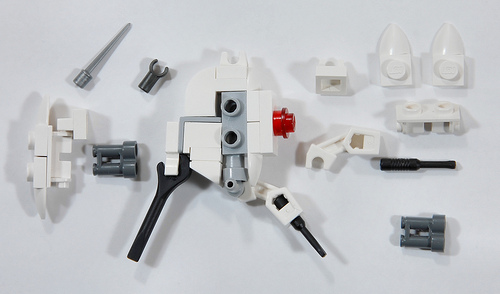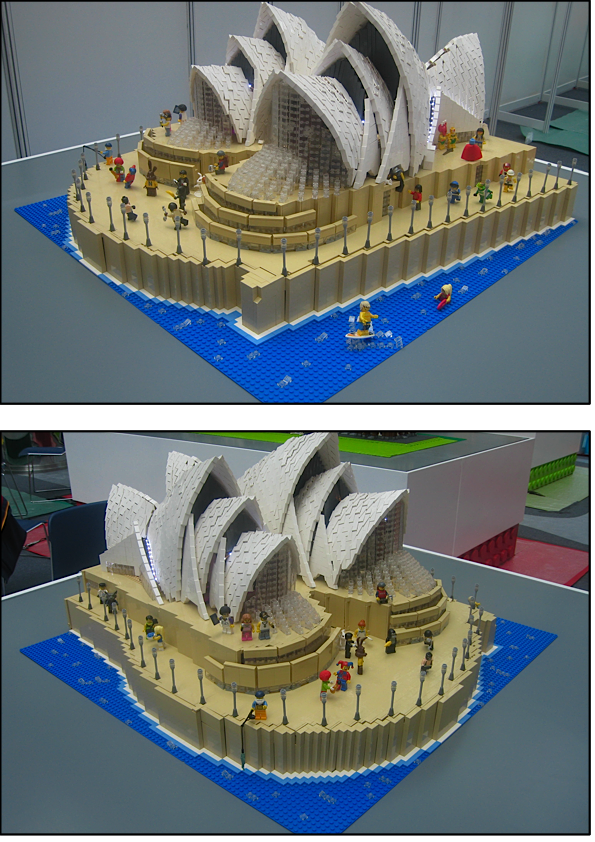I love it when someone else does some clever work so you don’t have to. Mike Yoder (builder42) has been experimenting with ‘stage set’ dioramas. Each of them involves arranging a set of basic structures into formation for a single shot. Personally I think this is a great idea and one I hope to see more of.
Category Archives: Building Techniques
This could become a new event at Lego conventions around the globe.
I give you FeiJi Cup Dog Racing. Designed and built by a father/son team, Tomi & his Dad, this brings back memories of playing that old electric vibrating football game. I have to say that this racing creation is simply ingenious. I may have to go build one and play it with my kids.
The video is fun. Watch it now.
Many thanks to rongYiren for bringing this to my attention.
Meditation is good for your bones
The Quest for Wisdom
Infomaniac has been working on a series which depicts a lone seeker on his quest for answers. I have to say that my favorite, so far, is this one. It is a striking build with a very clean presentation. Excellent!
Nightmare Carriage
Until today I was unfamiliar with the work of RGB900 but I’m very glad to have spotted his work on Brickshelf today. His Nightmare Carriage has excellent brick built horses and some wonderful use of parts. I’m very happy to have made my acquaintance with his photostream.
[Enter gratuitous sheep joke here]
I looked at it, so now you have to. Guy Himber has done it again and I don’t know whether to laugh, cry or run away. I do know one thing. It’s disturbing on a deeper level because someone just saw this over my shoulder and swore at my screen. So it must be good, right?
(Before anyone asks, all the pieces are connected…except for the eyebrows and nostril bits)
Window into a hole
This one goes out to the town builder readers. Larry Lars is still going on his illustrated guides to windows and I’m still watching. If you build town there will be a window for you.
Finally, a nemesis worthy of my vast intellect
Following his amazing GLaDOS from Portal 2, Brandon Bannerman (Catsy) miniaturizes a turret to minifig-scale (or near enough), alongside an adorable custom Chell fig, complete with ASHPD.
For all of you out there who’d like your own turret to keep you company during the long twilight of civilization, Brandon has kindly posted instructions.
Another interesting thing about Brandon’s design has been watching it evolve based on feedback from fellow builders. See the earlier iterations here and here, together with the comments that inspired the final version.
Sydney Opera House
The Sydney Opera House is probably one of the hardest buildings to make in LEGO due to its compound curves. All attempts I can remember seeing have used plate sculpting which gets the shape right but not the smooth texture of the shells. Until now!
Bad Leo has used a building technique that is nothing short of brilliant to construct the compound curves. I believe this is similar to how the real opera house is constructed. The end result is amazing.
Beautiful, beautiful cheese floors
I’m consistently wowed by the geometric designs that Katie Walker fiddles with and frequently shares. It’s extra rewarding when she incorporates the results of her experiments into beautiful architecture like this grand staircase and mosaic floor.
Human-powered transport
As much as I like to see more Asian elements within the available palette of LEGO elements, and as addicted as I am to the collectible minifigs, I can’t say I’m thrilled with the hair piece used for both (both?!) the sumo wrestler and geisha. Nevertheless, I can’t help but love anything that springs from the brilliantly bricking fingers of Michael Jasper.
Via twee affect, which has a nice discussion of the various interesting techniques that Michael inevitably applies to his LEGO creations.
Doors opening... please stand clear
Esben Kolind is one of the few LEGO builders who can combine excellent working features and nice looking designs. A browse through his Youtube account is sure to please those of a technical bent and those who like pretty train models. His latest intercity train expands on his old ideas to feature three simultaneous working doors through some superb compact technic design.
If you are interested in knowing more follow the discussion at Eurobricks.











